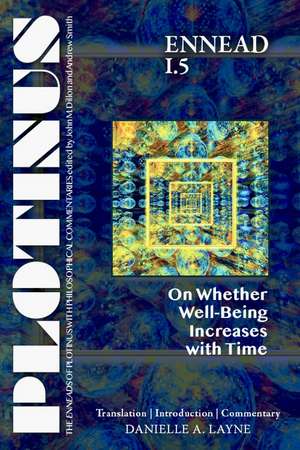Plotinus Ennead I.5: On Whether Well-Being Increases with Time: Translation with an Introduction and Commentary: The Enneads of Plotinus
Autor Danielle A. Layneen Limba Engleză Paperback – 21 feb 2024 – vârsta ani
Preț: 235.65 lei
Nou
Puncte Express: 353
Preț estimativ în valută:
45.09€ • 47.14$ • 38.11£
45.09€ • 47.14$ • 38.11£
Carte disponibilă
Livrare economică 13-27 februarie
Livrare express 29 ianuarie-04 februarie pentru 18.72 lei
Preluare comenzi: 021 569.72.76
Specificații
ISBN-13: 9781733535748
ISBN-10: 1733535748
Pagini: 152
Dimensiuni: 127 x 191 x 13 mm
Greutate: 0.23 kg
Editura: Parmenides Publishing
Colecția Parmenides Publishing
Seria The Enneads of Plotinus
ISBN-10: 1733535748
Pagini: 152
Dimensiuni: 127 x 191 x 13 mm
Greutate: 0.23 kg
Editura: Parmenides Publishing
Colecția Parmenides Publishing
Seria The Enneads of Plotinus
Notă biografică
Danielle A. Layne is Professor of Philosophy at Gonzaga University. She has published widely on Plato and the Platonic tradition, most notably the edited volume, with Harold Tarrant, The Neoplatonic Socrates (Penn State 2014) and the essay relevant for this book, “The Present Moment in Neoplatonic Philosophy” (Epoché: A Journal for the History of Philosophy 23, no. 2 [Spring 2019]: 445–460).
Textul de pe ultima copertă
"This is an exceptionally rich study of Plotinus's arguments distinguishing the life well-lived (in time) and genuine well-being (which is eternally present), drawing on the whole body of the Enneads as well as this one short treatise. Danielle Layne elaborates and explains the conversation between Plotinus and his predecessors, especially Aristotle. Scholars and philosophers concerned with Aristotle's ethics and metaphysics will find much to debate here, and those inclined to follow Plotinus' lead will profit from her guidance.”
—Stephen R. L. Clark, Emeritus Professor of Philosophy, University of Liverpool
"With a succinct introduction, detailed commentary, and clear translation, Layne unravels and explains Plotinus' condensed ideas on well-being and time and puts them into the context of Platonic, Aristotelian, Stoic and Epicurean discussions. A welcome contribution to Neoplatonic studies."
—Wiebke-Marie Stock, University of Bonn, Germany, and Guest Assistant Research Professor at the Medieval Institute, University of Notre Dame
Descriere
In Ennead I.5 Plotinus attempts to navigate a well-trodden path of inquiry by directly responding to a wide spectrum of popular theories on human flourishing, and insisting emphatically that well-being belongs to the present moment. Indeed, Aristotle—with his insistence that well-being be measured by “a complete life” (Nicomachean Ethics 1098a16–20) or a life measured by virtue, a modus vivendi sustained via the development of appropriate habits (hexis) and the avoidance of misfortunes—is one of Plotinus’ central targets. Nevertheless, it is also obvious that the Hellenistic schools, with their almost evangelical insistence that happiness is available to practitioners in the immediacy of the “now,” take pride of place in Plotinus’ short treatise on the subject. Layne analyzes in depth Plotinus’ unique conception of the value of the present moment by highlighting his dialogue with Aristotle and Hellenistic conceptions of the soul, pleasure and pain, time and eternity, and so forth.




